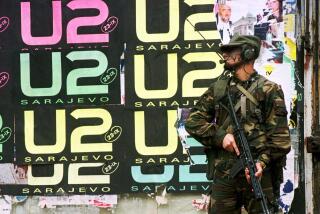Blue-Beret Power: Now It’s Yugoslavia : U.N. peacekeeping force begins to arrive in Croatia
- Share via
Three years ago the news that a crowd had seized the central plaza in a communist capital, singing rock songs and demanding the overthrow of the ruler, would have made headlines everywhere. Last Wednesday a crowd did just that in Belgrade, Serbia, and the world took only passing notice. We forget that though communism has been eliminated as a threat to the West, it remains an oppressive force in the lives of millions.
Thanks to Tito’s break with Stalin, Yugoslavia’s communism always seemed more Yugoslavian than Russian and was less utterly despised than communism in the true Soviet satellites. As a result, the Yugoslav successor republics--including Serbia, which has sought to preserve some form of the federation under its own domination--have, as it were, skipped a step. Without even a “velvet revolution” like Czechoslovakia’s, they have presented themselves as candidates for full membership in the new Europe.
Croatia’s Franjo Tudjman and Serbia’s Slobodan Milosevic--both of them communist leaders “grandfathered” into the post-communist era--have brought one murderously bad habit along with them. Both have suppressed dissent and amassed power by demonizing an external enemy. The mutual hatred of the Serbs and Croats is of long standing. These leaders have not created it from nothing. And yet both have clearly made the most malignant use of it, forcing into terrified silence those Serbs and Croats who well know that neither of these sister nations poses a genocidal threat to the other.
What has strengthened the hand of dissent, and thereby of democracy, in Serbia has been the arrival in Croatia of the first contingents of what will be a 14,000-member U.N. peacekeeping force--a visible world vote for peace against the Serbian vote for war and a boost to Serbia’s peace lobby. Moreover, by actually doing the work of peacekeeping, the U.N. force robs Croatian as well as Serbian demagoguery of the active ingredient in its paranoia potion. Truth is, classically, the first casualty in war. The U.N. force gives truth a chance, and truth gives peace a better chance.
Wishful thinking? Perhaps, but it is wishful thinking of another sort that sends armies into the field. If successful, this U.N. intervention, the largest since the Congo intervention of the mid-1960s, will be of historic importance precisely because of the small role that military action will have played in it. The war will have been brought to a halt by economic sanctions, followed by shrewd diplomatic pressure (the European Community’s recognition of Slovenia and Croatia), followed by the deployment of a peacekeeping force that strengthened the hand of the peace parties on either side.
Where is the new world order taking shape? Is it at the Pentagon, whose recently leaked security blueprint calls for keeping the current U.S. active-duty troop level at 1.6 million to the year 2000 and beyond while actively resisting efforts by key allies to provide their own security? America just can’t afford that kind of endless mobilization. What we can afford is our share of something genuinely promising, genuinely new. Two cheers for the emerging vision of a new world order reflected in the United Nations’ blue beret.
More to Read
Sign up for Essential California
The most important California stories and recommendations in your inbox every morning.
You may occasionally receive promotional content from the Los Angeles Times.













